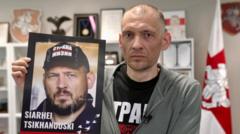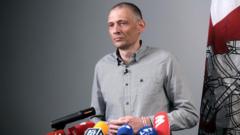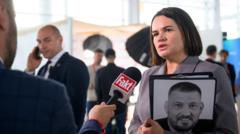The ruling has raised concerns about democratic integrity in Ivory Coast ahead of the upcoming elections.
**Ivorian Opposition Leader Disqualified from Presidential Race**

**Ivorian Opposition Leader Disqualified from Presidential Race**
Judiciary removes Tidjane Thiam from electoral roll, marking a significant setback in his political aspirations.
The main opposition leader in Ivory Coast, Tidjane Thiam, has been effectively eliminated from running in the forthcoming presidential election after the judiciary ruled him ineligible. Despite Thiam's efforts to renounce his French citizenship to vie for the presidency, the court concluded that his acquisition of French nationality back in 1987 resulted in the forfeiture of his Ivorian citizenship.
In a decisive ruling that cannot be contested, the court's decision poses a substantial threat to Thiam's political ambitions, particularly after he was confirmed as the sole candidate for the centre-right Democratic Party, the PDCI. Just last week, Thiam secured 5,321 votes from a total of 5,348 in a party nomination, underscoring his popularity within the opposition.
Thiam has condemned the ruling as an "act of democratic vandalism," arguing that it disenfranchises a significant portion of the electorate. His disqualification comes on the heels of restrictions imposed on three other high-profile contenders, including former President Laurent Gbagbo, intensifying concerns about the fairness of the upcoming elections.
While the ruling RHDP party has yet to unveil its candidate, President Alassane Ouattara, aged 83, seems poised to seek a fourth term. Thiam’s remarks indicate that he believes the current administration, facing declining support, is resorting to legal measures to maintain control rather than engaging in a fair electoral process. As one of the few prominent political figures with a distinguished educational and professional background—having been the first Ivorian graduate of the prestigious French Polytechnique and having held senior roles at major firms like Credit Suisse—Thiam's exit from the race raises alarms about leadership dynamics in the nation.
Despite his extensive experience and past political roles, including a stint as planning minister in the late 1990s, Thiam's path has taken many unexpected turns, especially after the coup that saw the PDCI ousted from power. Post-politics, he thrived in various global business positions before returning to the political arena, illustrating the complexities of Ivory Coast’s political landscape.
In a decisive ruling that cannot be contested, the court's decision poses a substantial threat to Thiam's political ambitions, particularly after he was confirmed as the sole candidate for the centre-right Democratic Party, the PDCI. Just last week, Thiam secured 5,321 votes from a total of 5,348 in a party nomination, underscoring his popularity within the opposition.
Thiam has condemned the ruling as an "act of democratic vandalism," arguing that it disenfranchises a significant portion of the electorate. His disqualification comes on the heels of restrictions imposed on three other high-profile contenders, including former President Laurent Gbagbo, intensifying concerns about the fairness of the upcoming elections.
While the ruling RHDP party has yet to unveil its candidate, President Alassane Ouattara, aged 83, seems poised to seek a fourth term. Thiam’s remarks indicate that he believes the current administration, facing declining support, is resorting to legal measures to maintain control rather than engaging in a fair electoral process. As one of the few prominent political figures with a distinguished educational and professional background—having been the first Ivorian graduate of the prestigious French Polytechnique and having held senior roles at major firms like Credit Suisse—Thiam's exit from the race raises alarms about leadership dynamics in the nation.
Despite his extensive experience and past political roles, including a stint as planning minister in the late 1990s, Thiam's path has taken many unexpected turns, especially after the coup that saw the PDCI ousted from power. Post-politics, he thrived in various global business positions before returning to the political arena, illustrating the complexities of Ivory Coast’s political landscape.





















